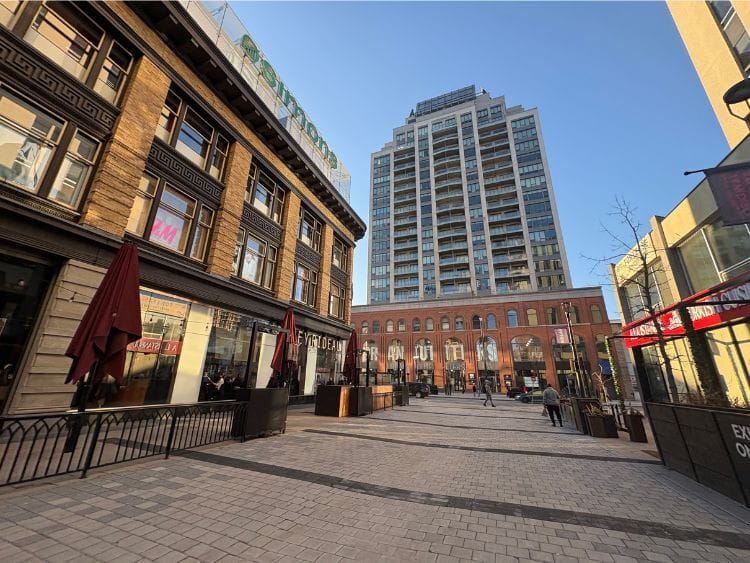With files by Charlie Senack.
It’s no secret that businesses across Canada are starting to feel the trickle-down effects of U.S. President Donald Trump’s tariffs.
While we may not think of tariffs on aluminum or car parts as particularly relevant in our day-to-day lives, the trickle down from things to restaurant ingredients to orange juice to birthday decorations is all around us. And Ottawa businesses are not immune, either.
As the federal election reaches its watershed moment, the Ottawa Lookout spoke to members of the Ottawa business community to check the temperature on what might help businesses in different sectors.
Coming off the Liberals’ winter GST break, there was some reprieve for restaurants, said Michael Wood, a small business advocate and former owner of Ottawa Special Events.
“Different people have different sides of what the impact was. I've actually heard from servers in restaurants that have said tips were down because a lot of people just see the bill and then tip, even though you usually tip before taxes,” he said. “But the businesses themselves did see a couple more people coming in.
Restaurants Canada said they saw immense benefits from the tax break and wanted to see it become a permanent fixture. According to Global News, data from the online reservation platform OpenTable showed an 18 per cent jump in seated diners over the first two weeks of the tax holiday compared to the previous year. Over a 60-day period, the group said it expected to see a $1.5-billion boost in sales.
While the federal tax holiday has since ended, Wood added that the soaring cost of renting a space for businesses is eating into other expenses.
“We're in this really delicate balancing game right now of how does the business pay the staff enough that they're able to survive in the world that we're living in?” asked Wood.
Ontario’s minimum wage has also been increasing. While important for the employees who are dealing with hard economic times, it’s also putting a further burden on restaurants who are already dealing with surging costs in various sectors. For comparison, in 2018 the province’s minimum wage was $14 an hour. Today it’s $17.20 an hour. It will then go up again on Oct. 1 to $17.60 an hour.
Wood said that lower taxes would help all Canadian businesses.
Andrea Steenbakkers, executive director of Barrhaven Business Improvement Area (BIA), said that Ottawa businesses are “busting at the seams” with the threat of Trump’s tariffs, and post-COVID-19 inflation.
”If you're selling goods that are produced in the US or goods that have parts that come from the US, obviously that means your prices have to go up and consumers too have limited budgets these days,” said Steenbakkers. “There’s also the other side of the coin: If you're selling goods to the US and there's a tariff imposed there, then IT makes your products or services less attractive because they're more expensive and less competitive.”
The federal government has so far committed to retaliatory tariffs on $30 billion worth of goods, as well as remitting tariff revenue to employees whose employment has been affected. But it’s changing by the day as the situation remains unsettled.
Steenbakkers said opening up interprovincial trade barriers could help.
Another issue impacting businesses is crime. Many areas across Ottawa have recently seen this, and the once quiet suburb of Barrhaven has not been immune.
“There are costs to loitering because it can intimidate customers and staff. There is petty theft, which doesn't cost as much as an organized group that comes and does a sweep or the smash and grabs that you're seeing at Bayshore, for example, with the jewelry stores. We saw it in Barrhaven too with the Shoppers Drug Mart perfume raid,” said Steenbakkers.
The Barrhaven BIA has recently created a safety toolkit to help its members deal with any safety scenario. She said at a federal level, more reform is needed to stop repeat offenders.
Aron Slipacoff, executive director for the Wellington West BIA, said that a silver lining of the Trump tariffs has been a surge in the idea of shopping locally. He added that small businesses form an “ecosystem” that goes beyond the purchase of a product or service, but a connection to someone’s story and passion.
Slipacoff, too, said that lower taxes on businesses would be conducive to supporting “a huge, huge piece of our economy in terms of job creation, and economic value, so invest in it, make it easy.”
Ian Lee, a professor at the Sprott School of Business at Carleton University, told the Ottawa Lookout that the conversation around buying local is “tricky.”
“If it's voluntary by consumers, that's fine. That's called consumer choice,” said Lee.
The issue, he said, is whether any level of government imposes restrictions such as tariffs on non-Canadian products as retaliation.
“People can dress it up with slogans called buy local or buy Canadian, but it's protectionism.”
Lee said that just because Trump is doing it, it doesn’t mean it is a good idea for the economic health of Canadians at large.
“Tariffs and local preferences discriminate because they force consumers or governments to buy more expensive products.”
Lee pointed to high cell phone fees and air fare as examples of Canadian monopolies driving up prices for Canadians, and restated that we should support local if we want to, not because we have to.




